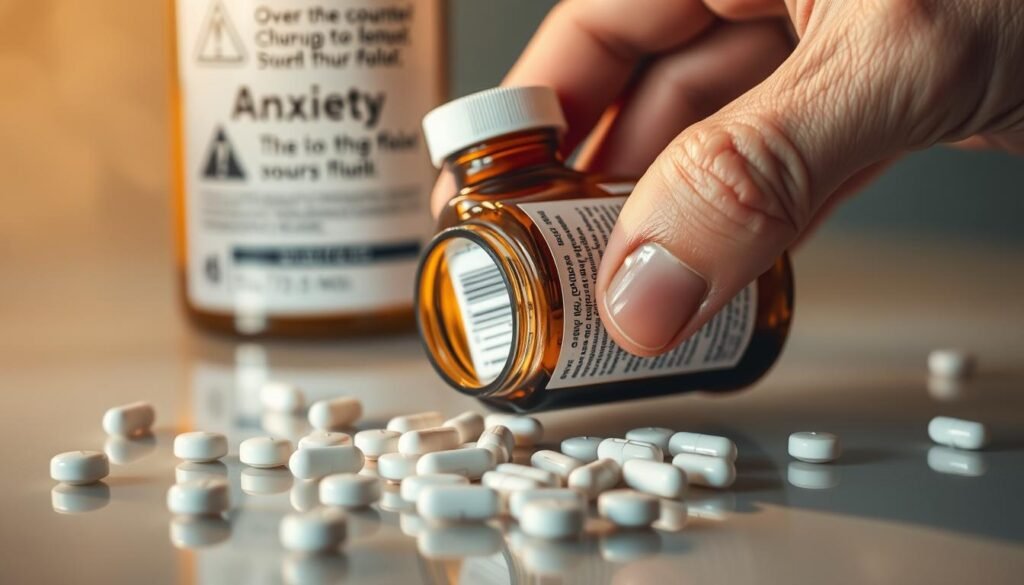A recent study in JAMA Psychiatry found SSRIs might not be as effective for anxiety as thought. In fact, they could work no better than a placebo. This raises serious concerns about the safety of OTC anxiety medications. These drugs, while easy to get and often seen as a fast solution, have big risks. These risks include the chance of getting addicted and becoming dependent on the medication.
Benzodiazepines are the top prescribed anxiety medication. They work fast, usually in about 30 minutes to an hour. Yet, their effectiveness can drop after only four to six months of regular use. This might lead users to take more, which is very risky. Side effects include feeling sleepy and not being able to coordinate well. There’s also a high risk of overdosing, especially when mixing them with other drugs.
Knowing the risks linked with OTC anxiety meds is key for managing anxiety well. Being informed about the dangers can help users make better choices. It also encourages them to look for safer ways to deal with anxiety.
Key Takeaways
- OTC anxiety medications may lead to medication dependence if used for extended periods.
- Benzodiazepines can lose effectiveness after 4 to 6 months of use.
- Combining benzodiazepines with alcohol can significantly raise the risk of overdose.
- Understanding the side effects of these medications is crucial for safe usage.
- Regularly reviewing medications, including OTC options, is recommended for safety.
- Alternative therapies like yoga and relaxation training can be effective for anxiety management.
Understanding Over-the-Counter (OTC) Anxiety Medications
Over-the-counter (OTC) anxiety medications are drugs you can get without a prescription. They are meant to ease anxiety symptoms. These drugs often include antihistamines and herbal supplements, which can help with anxiety relief. It’s crucial to know about their possible risks and side effects though.
Some people think these medications are totally safe. Yet, they can cause harmful effects. Side effects might be mild allergies like itching or rashes. Taking them with other drugs can increase the risk of more severe side effects. It’s important to understand how these drugs can interact with each other.
Diet can affect how these OTC drugs work in your body. Knowing whether to take them with food is important for them to work right. People with conditions like asthma or diabetes should be extra careful, as they may have more side effects.
Older adults should be especially careful. They might take various medications that interact in harmful ways. They should watch closely for any bad reactions. If they think a drug is causing side effects, they should see a doctor immediately.
Even though you can buy these drugs easily, prescription medications are often better for treating anxiety. A doctor’s advice is crucial for safe and effective treatment of anxiety disorders.
For more information on the safety and effectiveness of OTC medications, visit this link.
Common OTC Anxiety Medications and Their Uses
People looking for anxiety relief options often choose OTC anxiety meds. Such medications include the likes of diphenhydramine, found in Benadryl, and doxylamine. They are antihistamines, which means they can calm mild anxiety symptoms.
Valerian root is a well-liked herbal choice. It’s known for helping with relaxation. However, it’s important to use valerian root carefully. It can cause withdrawal symptoms and liver damage if used too much.
For other uses of OTC medications, some turn to ashwagandha. This herb may lower stress levels by keeping cortisol balanced. Furthermore, kava root can ease anxiety symptoms. But, like valerian root, it poses risks to the liver.
Knowing about these OTC options helps people make better choices for their mental health. Always talk to a healthcare provider before starting any new treatment. This ensures it’s safe and right for your needs.
Anxiety Medication Side Effects
Before choosing over-the-counter (OTC) anxiety meds, it’s key to know the possible anxiety medication side effects. Understanding short-term and long-term impacts is crucial for informed choices about managing anxiety.
Short-Term Effects
OTC anxiety drugs, like benzodiazepines, lead to:
- Drowsiness
- Dizziness
- Impaired coordination
These can offer quick anxiety relief. But, they might make daily tasks, like driving, risky. Taking too much can cause serious problems, like confusion and trouble breathing.
Long-Term Effects
Using anxiety meds for a long time has risks. These include:
- Dependence and tolerance
- Cognitive decline
- Mood disorders
Long-term use might make drugs less effective. This could lead to needing more of the medication. It increases the chance of facing harmful anxiety medication side effects.

Safety Concerns with OTC Anxiety Medications
Over-the-counter (OTC) anxiety medications come with significant safety issues. While they can offer quick relief for mild symptoms, misuse may cause serious health problems. Knowing the risks of addiction and overdose is vital for anyone using these drugs.
Risk of Addiction and Dependence
Many OTC anxiety medications have a high risk of addiction. For example, substances like diphenhydramine can cause dependence with repeated use. People may need larger doses for the same effect, which can worsen the issue. During the COVID-19 pandemic, self-medicating became more common, with its rates increasing greatly. This shows how easily people can turn to OTC drugs without expert advice, raising addiction risks.
Medication Overdose Risks
Misusing or overusing OTC drugs can lead to medication overdose, which is dangerous. Overdose symptoms include severe respiratory issues, which can be deadly if not treated. The misuse often stems from not knowing the correct doses, especially during mental health challenges in the pandemic. It’s critical to recognize overdose signs and get urgent medical care. Referring to OTC safety resources can help understand safe usage and stress the need to consult healthcare professionals.

Natural Anxiety Remedies as Alternatives
Many people look into natural anxiety remedies as safer choices compared to over-the-counter (OTC) drugs. These options have fewer side effects and a lower chance of dependency. It’s key to understand how effective they are versus OTC medications. Be aware of various natural remedies that might help.
Effectiveness Compared to OTC Medication
Some studies show natural anxiety remedies could work as well as OTC medications for mild anxiety. Remedies like valerian, chamomile, and lavender may help, but they need more research to prove their worth. Kava, once thought to help with anxiety, is now questioned due to liver damage concerns. Passion flower could help in the short term. Lemon balm and CBD have been found useful in some cases.
Popular Natural Remedies
Several natural remedies are well-known for easing anxiety. Below is a table showing common remedies and what people say about them:
| Natural Remedy | Effectiveness | Safety Concerns |
|---|---|---|
| Kava | Some reports indicate benefit | Risk of serious liver damage |
| Passion Flower | Generally considered safe | |
| Valerian | Mixed results, some report less anxiety | Limited long-term safety data |
| Chamomile | Short-term symptom relief | Possible bleeding risk with blood thinners |
| Lavender | Can reduce anxiety through oral intake or aromatherapy | Unsafe during pregnancy and breastfeeding |
| Lemon Balm | May lessen anxiety symptoms | Safety during pregnancy is uncertain |
| Exercise | Helps mitigate anxiety symptoms | Generally safe and recommended |
| Meditation | Helps relieve anxiety symptoms | Widely regarded as safe |
Natural anxiety remedies are interesting for those looking for other options than OTC medications. Even though these choices may help, always talk to a healthcare provider before changing your approach to managing anxiety.

Prescription Anxiety Treatments: A Closer Look
It’s important to know how prescription anxiety treatments can help. These options, like benzodiazepines and SSRIs, provide relief for severe or ongoing anxiety. In this part, we’ll talk about the time to consider prescription help and how it stacks up against OTC choices.
When to Consider Prescription Medication
If anxiety makes everyday life hard and other treatments don’t help much, prescription medicines might be needed. Prescription anxiety treatments often work better than OTC options. They are suggested for issues like generalized anxiety disorder and social anxiety disorder, mainly when symptoms mess with your job or personal life.
Comparison with OTC Options
OTC medicines include things like natural supplements and antihistamines. But they usually don’t control symptoms as well as prescription drugs do. A thorough look at OTC options shows they can help with light anxiety. Yet, those with severe cases might need stronger treatments. Prescription drugs like SSRIs and benzodiazepines have more side effects and addiction risks. It’s vital to see your doctor often to check how well your treatment is working and deal with any negative effects.
| Medication Type | Common Uses | Potential Side Effects |
|---|---|---|
| Benzodiazepines | Short-term anxiety relief | Dependence, dizziness, drowsiness |
| SSRIs | Long-term anxiety treatment | Weight gain, sexual dysfunction, insomnia |
| OTC Antihistamines | Mild anxiety relief | Drowsiness, dry mouth, dizziness |
Real-Life Impacts: Cases of Benadryl Abuse
The issue of misusing Benadryl, or diphenhydramine, is growing, especially among teenagers. Disturbingly, they are taking part in the “Benadryl Challenge” seen on TikTok. This challenge has led to emergencies and even deaths, making the situation grave.
The FDA warns that too much Benadryl can cause severe health problems. They urge everyone to stick to the recommended doses.
In 2020, a TikTok challenge had a tragic end when a 15-year-old died. This event highlights the serious risks of abusing Benadryl. Symptoms of its misuse include feeling sleepy, confused, and having mood swings. These can harm a young person’s life and relationships deeply.
Long-term misuse of Benadryl is also dangerous. It can lead to brain problems and serious emotional issues. The FDA is working to get harmful videos off TikTok. They also want doctors to help parents understand the dangers of Benadryl misuse.
Key Statistics on Benadryl Misuse:
| Statistic | Detail |
|---|---|
| Emergency Cases | Reports of teenagers hospitalized due to Benadryl Challenge related incidents. |
| Drug Overdose Mortality | Benadryl was among the 10 most common medications linked to drug overdose deaths in 2017. |
| Dosing Guidelines | Recommended dose for adults is 25 mg to 50 mg every four to six hours. |
| Signs of Overdose | Symptoms include blurred vision, seizures, and extreme agitation. |
| FDA Actions | Investigating reports of misuse and advising on safe storage practices. |
As Benadryl misuse grows, understanding its real-life impacts is key to stopping it. The first steps are spreading awareness and education.
Understanding Melatonin Safety in the Context of Anxiety
Melatonin is a natural sleep aid popular among people with sleep issues linked to anxiety. It is naturally made in the brain, affected by the cycle of light and dark. This hormone rises at night and falls when it’s light. As we get older, we might make less of it, which can lead to sleep problems. Knowing about melatonin’s safety is critical, especially for those with anxiety.
Melatonin supplements are created in labs to help fix sleep cycle disorders. Studies show they make it easier to fall asleep and help with delayed sleep phase disorder. They can also lessen jet lag symptoms, which is great for people who travel a lot. But, side effects like feeling sleepy, dizzy, or having headaches raise safety concerns.
Melatonin can reduce night-time confusion for those with Alzheimer’s, highlighting its potential against anxiety in cognitive disorders. Still, it’s important to be careful with it. Long-term use and interactions with other drugs need attention. People with autoimmune diseases should steer clear of melatonin for safety reasons.
The market for melatonin supplements is tricky. Research found big differences in how much melatonin products actually contain. Some even had serotonin, which can be risky. Talking to a healthcare provider before using melatonin for sleep issues related to anxiety is smart. For more info on melatonin safety, check this comprehensive guide.
Conclusion
OTC anxiety meds can help briefly but have big risks like addiction and side effects. People looking for anxiety relief might not know these dangers. This lack of awareness can lead to harmful effects.
Seeking natural ways or asking doctors about prescriptions may be safer. With lots of adults facing anxiety, choosing wisely is key. Learning about these medications helps protect mental health.
OTC drug misuse, especially in the youth, needs more attention. Talking to professionals like pharmacists helps use these products safely. For more info on self-medication in Japan, check this study.